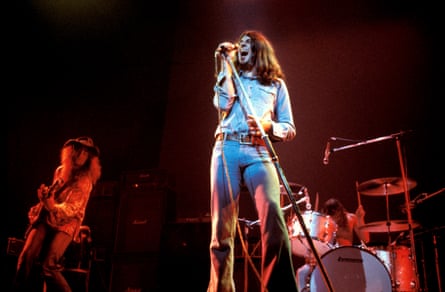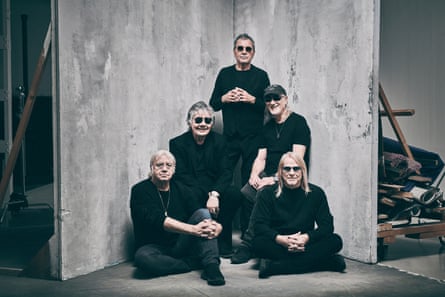You might think Ian Gillan, at 75 years old, would be fed up with singing Smoke on the Water. After all, he’s had to sing it at pretty much every show he’s played since 1972, whether with Deep Purple, the Ian Gillan Band, or Gillan. It was even a slightly ill-fitting encore during his brief spell fronting Black Sabbath in the early 80s. He must have heard rock’s most famous riff – if he has averaged even 50 shows a year over the past 48 years – somewhere in the region of 2,500 times. But he doesn’t mind.
He recalls the plight of Luciano Pavarotti, with whom he sang a couple of times, and who one day expressed his jealousy of Gillan getting to sing Smoke on the Water. “He said, ‘I’ve heard you sing it six times, and every time it’s different. Sometimes you’re driving it on. Sometimes it’s laid-back. Sometimes the patterns change or the nuances are different, but it’s the same song.’ And he said, ‘If I did that with any of my famous arias, if I changed one scintilla of expression or interpretation, I would be crucified by the critics, and the fans, because we’re not allowed to do that in opera. We have to mimic our original interpretation.’” By contrast, Gillan says, he has never once had cause to feel jaded.
Of course, he’s had a more varied life than most. He has been the singer of Episode Six (just don’t call them a cabaret band: “I find it slightly offensive. We were a pop group, a vocal harmony group”), Jesus on the original recording of Jesus Christ Superstar (Tim Rice later asked him to play General Peron in the first production of Evita), the singer of Deep Purple in three separate periods over 51 years (with whom, in his first spell from 1969-73, he apparently invented headbanging), fronted several of his own bands (one of them playing jazz rock), been Sabbath’s singer, run a luxury country house hotel (it went bust) and owned a motorcycle firm (it went bust). Perhaps it is with that range of activities in mind that he asserts: “I never describe myself as a hard-rock singer.”

Which is unfortunate, because almost everyone who knows his work would describe Gillan as a hard-rock singer. Not least because he continues to front Deep Purple, who have just released Whoosh!, their 21st album, to some of the best reviews they have had in ages, from some of the unlikeliest publications: even NME called it “ludicrously flamboyant”.
For much of his career, Gillan didn’t hang around. A few years here, then on to something else. “I think loyalty is overrated,” he says. “I’ve seen many musicians who have stayed with a sinking ship when their time has gone. Certain things have a natural lifetime, and unless they’re refreshed by a change in personnel or circumstances, they become tired, and I don’t want any part of that.” In his various spells with Purple, change has often been wrought by the caprices of their former guitarist Ritchie Blackmore, who eventually left the band to become a medieval minstrel. “We were both arseholes,” Gillan says, adding that the pair communicate these days albeit with difficulty. “Ritchie has nothing electronic in his house – no computers, no telephones, nothing like that. So he’s completely unreachable. But we do pass messages, and the atmosphere is quite good.”
But he’s been perfectly capable of making bizarre decisions on his own, often in the past with the aid of alcohol. “I was having a drink with Tony Iommi and Geezer Butler. We got thoroughly pissed one night and my manager called me the next morning and said, ‘If you’re going to make career decisions, don’t you think we should talk it through first?’ I said, ‘What are you talking about?’ He said, Apparently you agreed to join Black Sabbath last night.’ I couldn’t remember any of it.”
Nevertheless, he duly joined Sabbath for one album, Born Again, and a tour that has passed into legend as one of rock’s most disastrous. At the opening show, Gillan had a notebook with lyrics propped up against the monitors; he’d been using it in rehearsals, too. Just one thing: “With all the money being spent, they had never used dry ice at the rehearsals, but then this wall of shoulder high dry ice came out.” And so Gillan was reduced to bending down to try to read the words. “And as I leaned down to read the first line, the floor lights came on, blinding me. I was swatting at the air to wave away the smoke. It was pure Spinal Tap, a moment of panic.”

And that’s not all. “There was the dwarf and the druids and the gong …” The dwarf was meant to be the satanic infant from the cover of Born Again, and was to “die” in a terrible plunge from a monolith. “The dwarf fell off, and then carried on screaming because someone had moved all the mattresses away.”
Then there was the Stonehenge stage set itself. Either the specifications had been in metres when they should have been in feet, or it was built at actual size. Either way, it was too big for many of the venues Sabbath were meant to play. The crowd reaction at that opening show was not the awe Sabbath had been hoping for. “I looked out and the whole audience was in rictus. It was unbelievable.” Astonishingly, this didn’t inspire This Is Spinal Tap’s Stonehenge sequence: the film was already in production when the tour began.
Alcohol played a large part of Gillan’s life for many years – “a wonderful part”, he clarifies. His autobiography suggests he spent a great deal of time either drinking or in search of drink, but he was a social drinker who drank to get drunk, rather than someone who needed a bottle next to him at all times, he says. And these days, his post-show routine is rather more sedate than it used to be. “Bed and a book. I realised some years ago I had to radically change my lifestyle, because you can’t sustain it as you get older. When they stopped smoking in bars, that’s what did it for me, because I enjoyed a cigarette with my drink, just calming down and having a chat after the show with the guys. And then suddenly you couldn’t smoke, and I thought, ‘Good time to bin it, really.’ So I stopped going to the pub and I stopped drinking after the shows. Now I carry a kettle, a little mobile kettle, and I come back and have a cup of tea.”
Still, at one point he was drinking enough to get hepatitis on a US tour in 1971, I note. “Incorrect. I got hepatitis, but I got it from a Coke bottle. In those days there was no security. Anyone from the public could be wandering around backstage, and hepatitis was raging in New York at the time.” He then says the entire band caught hepatitis from the same Coke bottle. (Deep Purple were unusually unlucky in this regard: Blackmore caught it on a 1973 US tour as well.)

For all the rows, though, and the hepatitis, joining Deep Purple – at the same time as Episode Six bassist Roger Glover – was the best thing that ever happened to him. “I remember to this day the first gig at the Speakeasy, with tears in my eyes, looking at Roger, going, ‘This is it, mate. This is it.’ It was a very emotional point in my life. You can put together as many people as you like, and a lot of people tried it with supergroups in the 70s and 80s, but it doesn’t always work because the key factor is human chemistry. And that’s what we had.”
Still Deep Purple keep marching on. Steve Morse, who replaced Blackmore in 1994, has now been their guitarist longer than Blackmore ever was. Don Airey took over from Jon Lord (who died in 2012) as keyboard player in 2002. Gillan, Glover and Ian Paice remain from that classic 1969-73 lineup.
How does Gillan cope with it all – how does he still summon the screaming god of rock when he takes to the stage? “Twenty or 30 years ago I vowed I would never be screaming my nuts off when I was 75 years old. I used to be able to do the pole vault when I was an athlete, but I can’t do that any more either. I’ve dropped about a tone on my register and that made the screaming impossible, though I still yell a bit. I’m lucky to be in a band, Deep Purple, that is primarily an instrumental band.” He ponders a moment. “I’m just riding the pony.”

Comments (…)
Sign in or create your Guardian account to join the discussion